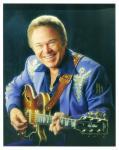The son of two amateur musicians, Roy Clark began playing banjo, guitar, and mandolin at an early age. By the time he was 14, he was playing guitar behind his father at local dances. Within a few years, he had won two National Banjo Championships, with his second win earning him an appearance at the Grand Ole Opry. Despite his success as a musician, Clark decided to pursue an athletic career, rejecting baseball for boxing. At the age of 17, he won 15 fights in a row before deciding that he would rather be a musician than a fighter.
Clark found work at local clubs, radio stations, and television shows. By 1955, he was a regular on Jimmy Dean's D.C.-based television show, Country Style. Once Dean left Washington for New York, Clark took over the show, and over the next few years he earned a reputation as an excellent musician and entertainer. In 1960, he decided to leave the East Coast to pursue his fame and fortune out West. That year, he became the leader of Wanda Jackson's band, playing on her hit singles like "Let's Have a Party," as well as touring with the singer and playing concerts with her in Las Vegas. Once Jackson decided to break up her band, Clark continued to play regularly at the Frontier Hotel in Vegas and through his new manager, Jackson's ex-manager Jim Halsey, he landed spots on The Tonight Show and the sitcom The Beverly Hillbillies, where he played both Cousin Roy and Big Mama Halsey.
In 1963, Clark signed to Capitol Records, and his first single for the label, "Tips of My Fingers," became a Top Ten hit. Over the next two years, he had a handful of minor hits for Capitol before he switched labels, signing with Dot in 1968. At Dot, his career took off again, through covers of pop songs like Charles Aznavour's "Yesterday, When I Was Young" (number nine, 1969). However, what really turned Clark's career around was not records, but rather a television show called Hee Haw. Conceived as a country version of Laugh-In, Hee Haw began its run in 1969 on CBS. Roy Clark and Bakersfield country pioneer Buck Owens were picked as co-hosts. Over the next two years, it was one of the most popular shows on television. In 1971, CBS dropped the show because its corny country humor didn't fit the network's new, urban image, but Hee Haw quickly moved into syndication, where it continued to thrive throughout the decade.
While Hee Haw was at the height of its popularity, Clark had a string of country hits that ranged from Top Ten singles like "I Never Picked Cotton" (1970), "Thank God and Greyhound" (1970), "The Lawrence Welk -- Hee Haw Counter-Revolution Polka" (1972), "Come Live With Me" (1973), "Somewhere Between Love and Tomorrow" (1973), "Honeymoon Feelin'" (1974), and "If I Had It to Do All Over Again" (1976) to a multitude of minor hits. Though he didn't consistently top the country charts, Clark became one of the most recognizable faces in country music, appearing on television commercials, Hee Haw, and touring not only the United States but a number of other countries, including a groundbreaking sojourn to the Soviet Union in 1976. Frequently, he played concerts and recorded albums with a wide variety of musicians from other genres, including the Boston Pops Orchestra and Clarence "Gatemouth" Brown.
In 1979, the momentum of his career began to slow down, as he left his longtime label ABC/Dot for MCA. Over the next two years, he had a number of minor hits before leaving the label. He recorded one inspirational album for Songbird in 1981 before signing to Churchill in 1982. Hee Haw's audience was beginning to decline in the early '80s, but Clark diversified his interests by investing in property, minor-league baseball teams, cattle, publishing, and advertising. None of Clark's recordings for Churchill were big hits, and his brief stays at Silver Dollar in 1986 and Hallmark in 1989 also resulted in no hits. Nevertheless, Clark had become a country icon by the mid-'80s, so his lack of sales didn't matter -- he continued to sell out concerts and win awards; he even made the comedy Western Uphill All the Way in 1986 with Mel Tillis. In 1987, he was belatedly made a member of the Grand Ole Opry. During the '90s, Clark concentrated on performing at his theater in Branson, MO, sporadically releasing re-recordings of his big hits on a variety of small labels, though 2000's Live at Billy Bob's Texas marked his first live release in nearly a decade. Christmas Memories followed that same year. 2005 saw the release of two albums, Hymns from the Old Country Church on Wonder Disc and Bluegrass: It's About Time, It's About Me, a collection of his bluegrass-oriented tracks, on Varese. ~ David Vinopal, All Music Guide
